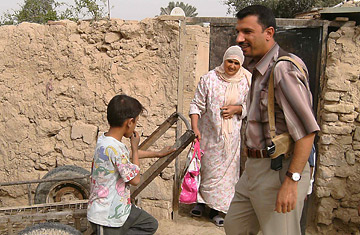
Captain Abdul Rahman Kudhair Madloom Al-Timemi, police chief of Haswah, Iraq.
The police chief of Haswah is on the verge of tears. Alone, out of uniform and lighting cigarettes one after another, Captain Abdul Rahman Kudhair Madloom Al-Timemi sits behind the large wooden desk of his dark office and ruminates on his imminent departure from this town of 30,000, about 25 miles south of Baghdad. He was fired, he says, for sectarian and political reasons. "I have done what I was hired to do," he says, his voice shaking. "I enforced the law. I was fighting for my country, but the government is filled people who fight for other motives and, now, they are taking everything from me."
Captain Rahman's story captures, in microcosm, the complex religious and political conflicts that continue to roil the Iraqi security forces even as the country's security situation improves — and the challenges facing the U.S. military in working with them. A former army officer, Rahman joined the new police service after Baghdad fell to coalition forces in 2003. Promoted to captain 11 months ago, he arrived in Haswah with a mandate to retake the city from the Mahdi Army militia of the radical Shi'ite cleric Moqtada al-Sadr. "Every day, the Mahdi Army would kill between 3 and 12 people, just for being Sunni," Rahman says. "They didn't even hide it. They would leave the bodies right in the street. The second day I was here, five of them came to this office and told me that this was their town, and if I messed with them I would regret it."
Captain Rahman, himself a Shi'a, refused to be intimidated. He added 70 Sunni officers to what had been a 225-strong, exclusively Shi'ite force, and began aggressively patrolling the streets, in conjunction with the U.S. military, to rid the city of its criminal militias. Inevitably, he found himself accused of bias by the Mahdi Army and its media, which accused him of being an agent, alternately, of the U.S., Israel and al-Qaeda. Death threats soon followed, and his fiancee's family's home was robbed.
While Captain Rahman was willing to endure threats and harassment from street thugs, the fate of his career, he says, was decided by Sadrists and other radical Shi'ite elements in the police chain of command. The trouble began, Rahman recalls, when his superiors urged him to lighten up on the Mahdi Army, and balance arrests of of Shi'ites by collaring more Sunnis. When he refused to arrest by quota, he says, the police department began investigating claims by Shi'ite detainees that he had abused and stolen from suspects. "None of this is true," he says, "They say anything they want and someone believes them, but there is no proof, none."
Despite the fact that Haswah is safer now than it has been in years, Rahman was told a few weeks ago that he would be relieved of his command. Colonel Ali Zahawi Press Al-Sultani, district commander of the Iraqi Police, argued to TIME that Captain Rahman had not won over the townspeople — even though the reason for Colonel Ali's presence at the Haswah station on this day is to meet with a 100-strong delegation of locals protesting Captain Rahman's firing. The colonel rejects Rahman's claim that he has been fired for political reasons. "There have been a lot of demonstrations against him that you have not seen," Ali insists. "There are many people in Haswah who do not like Captain Rahman."
For U.S. forces working in the area, the saga at the police station underscores the impenetrable nature of Iraqi factionalism. "I am certain that Captain Rahman's zeal for protecting the population of Haswah has attracted attention from political folks displeased with what he's accomplished," says Lieutenant Colonel Michael Getchell. "But I have no way of corroborating that politics were involved to the degree and in the way Rahman is alleging. What I do know, is that he now has a lot of pressure coming down on him, and my own request to the provincial police chief to let him stay has been denied, so there is no way he's going to be able to keep his job. All I can do is try to find a new place for him where he can continue to help the Iraqi people, while placating those from above who want him to move along."
After consulting with the provincial police chief, Colonel Getchell tried to get Captain Rahman to consider taking command of a police station, or even a patrol job, in a less populated area along the highway. But Captain Rahman, now convinced he will be killed if he remains in law enforcement, declined the offer. Rahman notes that an Iraqi police general who mentored him and defended him from political pressure was killed by an explosive device last December after resisting a transfer order. "Without the help of coalition forces," Rahman says, "I will be dead soon. If they don't protect me, nobody else can."
Colonel Getchell has come up with an imperfect solution. "Because Captain Rahman's English is excellent, I think he is going to become a translator for Coalition forces," says the U.S. officer. "This is not his first choice. He wants to be a police commander, but that's not possible right now. But maybe in six months, a year, after everything has cooled down, he could be an officer again."
Back in his darkened office, Captain Rahman is already packing up.
